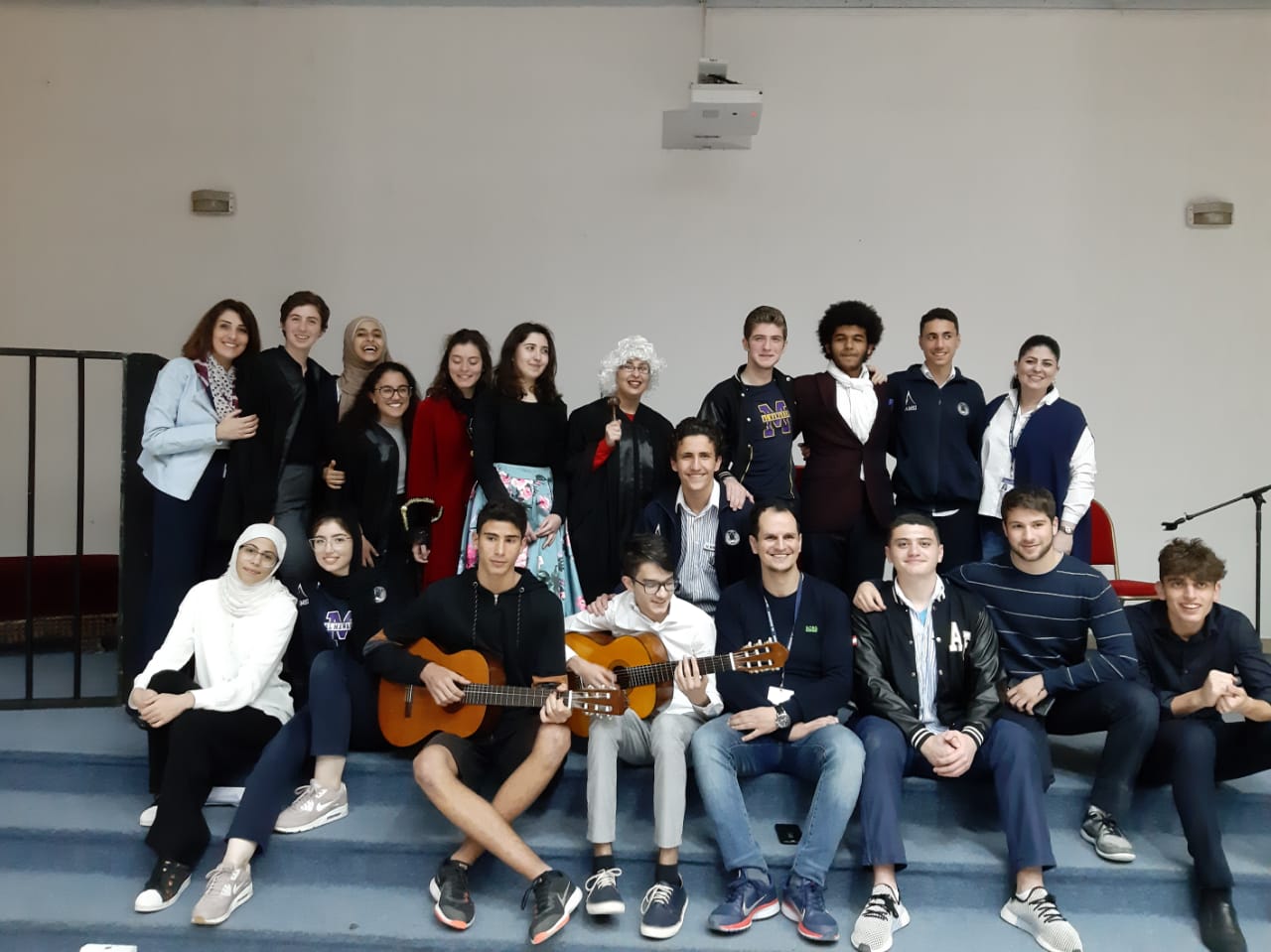by Reem Hazim
On Monday, February 11th, students, teachers, and even visitors from the KHDA gathered in the downstairs hall of the girl’s section to watch the third edition of the new History Trials series.
The History Trials are a series of debates staged as court trials launched this year by the Social Studies department. The first debate, held back in October, featured a face-off between the boys and girls of grade 12 about the infamous Watergate scandal. Then, last month, the second debate took place, featuring the students of grades 11 and 12 as they took different stances on the controversial issue of capitalism versus communism. This third edition, The Trial of Marie Antoinette, comes on the heels of the huge success of the first two debates, and the large turn-up of the audience was very impressive, especially considering that the event was held after school.
What set this edition apart from its predecessors is the incorporation of brilliant acting and fitting music into the event. As the event began, talented pianist Ali Nasri set the mood by playing Beethoven’s fifth symphony in perfect synchronization with the judge’s (played by Mrs. Daad, coordinator of the English department) entrance into the hall. The judge and the court clerk (Zain Manna) stayed true to their roles as they followed standard court procedures and announced the indictment of Marie Antoinette. Hostess Rama Celine Mahmalji delivered an excellent introduction to the event and presented helpful background information on the topic. Next, the ingenious Adrianna Sabbagh, dressed as Marie Antionette, delivered a moving speech asserting her character’s innocence and refuting all claims against her. Her realistic, emotional presentation put the audience under a spell of wonder and awe -even moved some to tears- and was supported by the guitar player Jad Diab, whose notes were perfectly tuned to her words. The speech even featured a climax where the soft background music came to an abrupt harshness that shocked the audience with its dramatic effect.
After the speech of the accused Marie Antoinette, the prosecution lawyer, Asal Al Khuwaiter, was called to stage to present her case. She was then asked to invite her chosen witnesses, Montesquieue (John El Khoury) and Voltaire (Hashem Riyan) to present their testimonies. Then, the defense lawyer (Jana Massoud) was similarly invited to defend Marie Antoinette and call her witnesses, Louis XVI (Fadi Chahine) and Thomas Hobbes (Reem Hazim). This unique group of witnesses, most of whom were political philosophers, were hand-picked by the mastermind behind the event himself, Mr. Ahmad Hachem, who worked tirelessly to organize the History Trials. It’s worthy to note that three of the witnesses were not contemporaries of the French Revolution or Marie Antoinette. Yet, they spoke from their experiences and expressed their individual philosophies regarding the monarchy and its absolute power.
After the witnesses presented their testimonies, the judge allowed each lawyer to cross-examine the witnesses and ask them their questions. This sparked a gripping debate where the characters swiftly refuted their opponents’ claims with strong evidence and well-articulated responses. This also created tension between the debaters, with Louis XVI even becoming so provoked as to raise his voice on stage, which prompted an adverse reaction from the judge.
Midway through the examinations, Thomas Hobbes objected to Montesquieu’s words, stimulating another face-off between both sides, as the debate escalated and the strain increased between the defense and the prosecution. This was succeeded by another objection from Voltaire, who stole the stage and presented his philosophies in an engaging manner. After both sides were satisfied with their arguments, they descended the stage and awaited the decision of the judge.
After heightening the audience’s suspense with an appropriate melody, the judge decided to execute Marie Antoinette. This initiated a dramatic scene where Marie Antoinette grieved over her fate and implored the court to have mercy on her. The play ended with another symphony that set a dismal, gloomy mood to befit the impending execution. The judge left the court with heavy steps and a firm expression on her face, and the audience clapped in a deafening roar of applause.
After the end of the trial, the four musicians, Jad Diab, Sami Yassine, Ali Nasri, and Aser Hammash played some beautiful symphonies of their own creation and other, more famous ones, such as Yiruma’s River Flows in You. Their performances ended in another round of applause and praise for their exceptional talents.
Her Honor’s decision to conform with the actual events of history left the audience wondering: How could history have changed had Marie Antoinette been pardoned and allowed to live?
